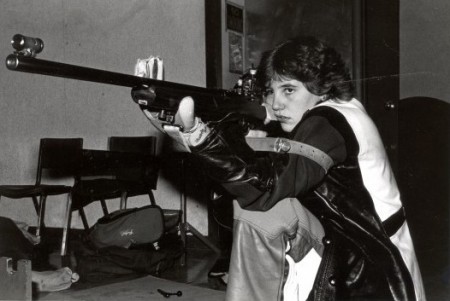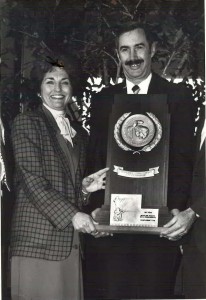
Underneath Roy Stewart Stadium, past the housing and athletic offices, past the entrance to the football offices, there is a door that almost always stands open. The Pat Spurgin Rifle Range is home to the most successful sports team on Murray State’s campus, with six U.S. Olympic team members, two NCAA championships, seven NCAA individual champions and six OVC championships to its name. Its legacy began before rifle was a recognized NCAA sport, and continues today, with a team laying the groundwork for its next big win.
Rifle was not an official NCAA sport until 1978, meaning the Racer rifle team was operating for more than 20 years as a varsity sport through the

president, Kala Stroup. Green coached both the 1985 and 1987 National Championship teams. || Photo courtesy of Sports Information
ROTC, organizing its own season of matches and taking on some of the biggest schools in the nation.
Ernie Vande Zande was a member of Racer rifle from 1968-71, making the All-American team all four years. During his tenure at Murray State, the rifle team claimed four National Rifle Association National Championships, all of which he remembers fondly.
“My freshman year we won two national championships,” Vande Zande said. “At that time there was one championship called international, which was Olympic-style shooting, and then there was a different championship using different rules, which was called American. We won national championships for both those styles of shooting my freshman year. We were used to winning.
“Our goal was to be the national championship team and we were. After we won the two national championships that year it was a great honor for all of us that Dr. Sparks, the president of the University, invited us over to Oakhurst to have dinner with he and his wife. And that’s something I’ll always remember.”
After that first year, Racer rifle hit a rough patch, losing its coach to military service. His replacement was less invested in the program, leaving the motivation and drive needed to compete at the top level to the shooters. The team came in second; an outstanding achievement for some, but not to the Racers who had so recently tasted victory.
Despite struggling through the adjustment, there were bright spots; moments that made it clear that despite not making their goal, Murray was still a force to be reckoned with.
“The trips to West Point (N.Y.) and Annapolis (Md.) stick out in my mind because you think of the great universities that those two are and the people who have graduated from there and gone on to do great things, and Murray State went there and dominated the match,” Vande Zande said, laughing. “That was fun. There’s no rubbing it in to those people, but when you think that a little school like Murray State, coming from Murray, Ky., with one theater, going up to the Naval Academy or to West Point and really dominating the competition; that was a cool thing.”
In 1988 Vande Zande was elected to the Murray State University Hall of Fame after winning a gold medal at the Pan-American games in 1975, two silver medals at the Pan-American games in 1979 and setting two world records at the Championships of the Americas in 1981. He also won five gold medals. Despite his international honors, Vande Zande’s heart is still in Murray, saying “It’s still great to be a Murray State Racer.”
By the time Vande Zande received his hall of fame honors, Elvis Green was seven years into his 18-year tenure as head coach of the rifle team.
Though he claims no personal credit, the Racers won both of their NCAA championships under Green and had 17 top-five finishes. In addition, two of Murray State’s six Olympic shooters were coached by Green. Green was himself inducted into the MSU Hall of Fame in 2004 and the Ohio Valley Conference Hall of Fame in 2008.
In 1978 Green was a senior enlisted advisor to the ROTC department, where he worked until 1981 when Racer Rifle lost its coach mid-season, and needed a replacement immediately. Green was recruited to fill his shoes.
“We just had some great kids, some great student athletes,” he said. “They worked hard for all that. That wasn’t me. That was them that made the program. I’ll take very little credit for what they (the team) did.”
When asked why he stayed on for nearly two decades, Green again referred back to the shooters, as both the reason the program was successful and the reason he didn’t leave.
“The youngsters,” Green said. “I was gonna quit a couple of times and they asked me to stay. I tried to take care of them. I tried to support them with what we had.”
Pat Spurgin Pitney was one of many on the team that felt that support. Earning the bulk of her accolades during her freshman year in 1984, including claiming gold in the Los Angeles Olympics for her performance in air rifle, she still counts the two national championships she was part of as dearer than her gold.
“Winning individually and winning as a team is totally different, and it’s so much more satisfying to win as a team,” Pitney said. “So just getting to bring that first national championship home. Elvis Green was our coach and he’d do anything for anybody. So it was really nice for the team to bring home a win for him.”
Pitney earned her degree in four years and ended her shooting career not long after. Today Pitney is the vice chancellor for administration at the University of Alaska, which she described as being a sort of city manager to the university. Though she now works for some of Murray State’s stiffest competition, she wishes nothing but the best for the Racer rifle team.
“I think there’s such great opportunity in Murray for anybody who wants to be serious about shooting at the college and in the international scene and there’s such a nice campus environment and community that really embraces this rifle team,” Pitney said. “I think just having really serious shooters who make the most of their student careers at Murray defines a level of pride at being a Racer. I hope the shooters do well. It’s time to bring home another national championship.”
Head Coach Alan Lollar couldn’t agree more. Now in his sixth season, Lollar has tried to build the program toward realizing its full potential, with a constant faith in his shooters and their ability to regain the gold.
In his six years, Pat Spurgin Rifle Range has seen a number of updates including the addition of electronic targets, providing instant feedback to shooters and also to rifle fans during matches. Lollar also tried to give the program a coach that could be there for the team.
“I just didn’t want Murray to rush into anything and to make sure they found the right person for the job,” Lollar said. “We had been through several part time coaches, and they had other jobs they had to do. They weren’t always around and what we were trying to do was get it back to the feel of a full-time coach like when Elvis was here.
“Over time we’re just trying to get the program back into the top four, with a chance every year to compete for a national championship and then if it’s our year, hopefully everything will fall together.”
Story by Kyra Ledbetter, Staff writer